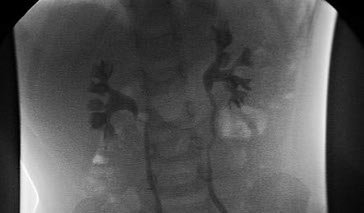Vesicoureteral reflux (VUR) occurs when urine from the bladder backs up into the ureters and kidneys. Normally, urine is produced in the kidneys and travels through tubes, called ureters, that are attached to the bladder. VUR is a serious issue that, left untreated, can cause permanent kidney damage.
Causes of Vesicoureteral Reflux
The causes of vesicoureteral reflux can be primary or secondary. Primary VUR is present at birth, is typically one-sided (unilateral)--affecting just one kidney and ureter--and occurs when one of the ureters doesn't grow to a proper length in utero. When this happens, the valve at the junction of the ureter and the bladder can be dysfunctional and causes urine to back up into the ureter and potentially the kidneys.
Secondary VUR occurs when a previously healthy flow somehow gets blocked. It occurs in children and adults and can result from anatomical or functional causes. In most instances, secondary VUR affects both ureters and kidneys (bilateral).
- Anatomical: Anatomical causes of VUR include changes in the structure or function of the bladder and/or ureters due to surgery or injury.
- Functional: Functional causes of vesicoureteral reflux include diseases that impact bladder function. For example, urinary tract infections (UTIs) can cause swelling in the bladder and ureters, blocking flow and allowing urine to back up into the kidneys. In men, an enlarged prostate can place pressure on the bladder, pushing urine from the bladder backwards into the ureters and kidneys.
Vesicoureteral Reflux Assesment
Regardless of the cause, VUR is measured or graded to determine severity. A grading scale from I to V is used to indicate how much urine is backing up into the ureters and kidneys. The five grades are as follows:
- Grade I: urine is refluxing only into the ureter
- Grade II: urine is refluxing into the ureter and the kidney, but causing no swelling
- Grade III: urine is refluxing into the ureter and kidney and causing mild swelling (hydronephrosis) and dilation
- Grade IV: urine is refluxing into the ureter and kidney and causing moderate hydronephrosis and dilation
- Grade V: urine is refluxing into the ureter and kidney, causing severe hydronephrosis and twisting of the ureter
Symptoms of Vesicoureteral Reflux
In many cases, vesicoureteral reflux does not cause any symptoms. When symptoms do develop, the most common is a urinary tract infection. Other symptoms include:
- Frequent urge to urinate
- Pain when urinating
- Decrease in urine volume
- Cloudy or foul-smelling urine
- Increased need to urinate at night (nocturia)
- Blood in urine (hematuria)
- Leaking urine
- Lower back, side, or flank pain
- Fever and chills
Vesicoureteral Reflux Diagnosis
Physicians have a number of ways diagnose VUR. Physical exams can identify blockages in the urinary tract, while urine and blood tests can determine if an infection is present and whether the kidneys are functioning properly. If vesicoureteral reflux is suspected, a number of diagnostic tests can confirm diagnosis:
- Ultrasound - Ultrasounds use sound waves to view organs and soft tissues inside the body and help a doctor determine if there are any structural abnormalities in the urinary system.
- Voiding cystourethrogram (VCUG) - This test uses X-rays in combination with contrast dye (injected via a catheter in the bladder) to view the bladder and ureters. X-rays are taken before and after urination to visualize bladder function and determine how well the bladder and ureters are functioning.
- Radionuclide cystogram (RNC) - This test is similar to the VCUG, except that a radioactive tracer is injected into the bladder to monitor urine flow. The RNC is more sensitive than the VCUG and may provide better imaging to diagnose less severe cases of vesicoureteral reflux.
Vesicoureteral Reflux Treatments
Treatment of vesicoureteral reflux depends on the severity of the condition. The goal of treatment is to prevent permanent damage to the kidneys, and can range from a watch-and-wait approach to surgery.
References
Vesicoureteral reflux. (2012). National Kidney and Urologic Diseases Information Clearinghouse. No. 11-4555


